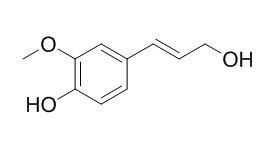Coniferyl alcohol
Coniferyl alcohol restores the growth of KI-treated BY-2 cells and N. benthamiana seedlings, at high concentrations is toxic to plant cells.
Inquire / Order:
manager@chemfaces.com
Technical Inquiries:
service@chemfaces.com
Tel:
+86-27-84237783
Fax:
+86-27-84254680
Address:
1 Building, No. 83, CheCheng Rd., Wuhan Economic and Technological Development Zone, Wuhan, Hubei 430056, PRC
Providing storage is as stated on the product vial and the vial is kept tightly sealed, the product can be stored for up to
24 months(2-8C).
Wherever possible, you should prepare and use solutions on the same day. However, if you need to make up stock solutions in advance, we recommend that you store the solution as aliquots in tightly sealed vials at -20C. Generally, these will be useable for up to two weeks. Before use, and prior to opening the vial we recommend that you allow your product to equilibrate to room temperature for at least 1 hour.
Need more advice on solubility, usage and handling? Please email to: service@chemfaces.com
The packaging of the product may have turned upside down during transportation, resulting in the natural compounds adhering to the neck or cap of the vial. take the vial out of its packaging and gently shake to let the compounds fall to the bottom of the vial. for liquid products, centrifuge at 200-500 RPM to gather the liquid at the bottom of the vial. try to avoid loss or contamination during handling.
Plants (Basel).2022, 11(21):2947.
Vietnam Journal of Food Control.2022, 5(3):pp.488-497.
Mol Cancer Ther.2024, 1535-7163.
Molecules.2022, 27(21):7643.
Bull. Natl. Mus. Nat. Sci.2021, 47(2),109-114.
Tissue Cell.2024, 88:102401.
Int J Mol Sci.2021, 22(8):4211.
Archives of Biological sciences2022, 00:21-21
LWT-Food Sci Technol2020, 109163
Asian Journal of Chemistry2014, 26(8):2425
Related and Featured Products
Planta. 2015 Jun 25.
Coniferyl alcohol hinders the growth of tobacco BY-2 cells and Nicotiana benthamiana seedlings.[Pubmed:
26108783]
Externally added Coniferyl alcohol at high concentrations reduces the growth of Nicotiana cells and seedlings. Coniferyl alcohol is metabolized by BY-2 cells to several compounds. Coniferyl alcohol (CA) is a common monolignol and a building block of lignin. The toxicity of monolignol alcohols has been stated in the literature, but there are only few studies suggesting that this is true.
METHODS AND RESULTS:
We investigated the physiological effects of Coniferyl alcohol on living plant cells in more detail. Tobacco (Nicotiana tabacum) Bright yellow-2 cells (BY-2) and Nicotiana benthamiana seedlings both showed concentration-dependent growth retardation in response to 0.5-5 mM Coniferyl alcohol treatment. In some cases, Coniferyl alcohol addition caused cell death in BY-2 cultures, but this response was dependent on the growth stage of the cells. Based on LC-MS/MS analysis, BY-2 cells did not accumulate the externally supplemented Coniferyl alcohol, but metabolized it to ferulic acid, ferulic acid glycoside, coniferin, and to some other phenolic compounds. In addition to growth inhibition, Coniferyl alcohol caused the formation of a lignin-like compound detected by phloroglucinol staining in N. benthamiana roots and occasionally in BY-2 cells. To prevent this, we added potassium iodide (KI, at 5 mM) to overcome the peroxidase-mediated Coniferyl alcohol polymerization to lignin. KI had, however, toxic effects on its own: in N. benthamiana seedlings, it caused reduction in growth; in BY-2 cells, reduction in growth and cell viability. Surprisingly, Coniferyl alcohol restored the growth of KI-treated BY-2 cells and N. benthamiana seedlings.
CONCLUSIONS:
Our results suggest that Coniferyl alcohol at high concentrations is toxic to plant cells.



